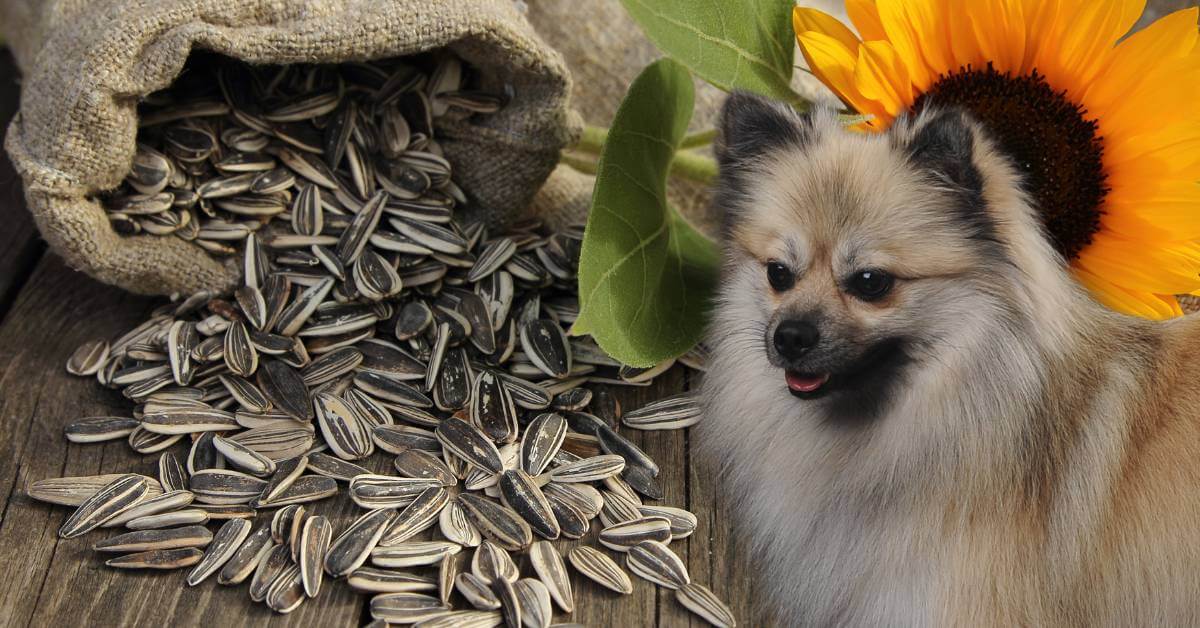Can Dogs Eat Sunflower Seeds?
Yes, dogs can eat sunflower seeds, but in moderation. If you’re snacking and your dogs are begging for some, just remove the shell before sharing. Sunflower seeds are not toxic to dogs and can provide nutritional benefits like healthy fats and vitamins. However, it’s important to remember that they contain more calories, so it’s best to enjoy them as an occasional treat.

If you’re enjoying sunflower seeds and want to share a few with your dog, that’s generally fine (again, just ask yourself if you want to make this a habit). Be cautious if your dog accidentally eats a whole bag of sunflower seeds, especially if they’re salted or still in the shell. That’s too much salt for them!
Are sunflower seeds good for dogs?
Sunflower seeds are nutritious and can be good for your dogs if you give them in moderation. These tiny seeds are packed with essential nutrients that offer several benefits.
Including these nutrients in your dog’s diet can contribute to overall well-being, enhancing their skin, coat, and immune system. How cool is that!
Should I then give my dog sunflower seeds?
I’m not really sure. Is this a snack your dog really likes? My dog has a strange love for peanuts, and even though peanuts are okay(ish), I give him only a few sometimes. If your dog is into sunflower seeds, it’s okay to give them some as an occasional treat. Just make sure they’re unsalted and shelled to keep it safe.
Here’s the deal: sunflower seeds are actually considered a healthy food, so that’s why I’m saying yes. When I did research for this article, I ran into something interesting. There’s a study about the effects of dietary flax seed and sunflower seed supplementation on dogs. This study was done in 2001, but it’s still so much interesting to see what scientists found.
This study examined whether adding flax and sunflower seeds to dogs’ diets could improve their skin and coat condition. They gave 18 dogs either flax seeds or sunflower seeds and checked their skin and coats using a scoring system. They also measured the levels of certain fatty acids (PUFAs) in the dogs’ blood.
They found that both groups of dogs had a temporary improvement in coat quality, but this didn’t last beyond 28 days. Dogs that ate flax seeds had an increase in certain fatty acids in their blood, while the sunflower seed group didn’t show these changes. The ratio of good fats to bad fats in their blood went up for a short time, peaking about two weeks before the best skin condition score.
In short, giving dogs flax seeds or sunflower seeds for a month can temporarily make their skin and coat look better, likely because of the increase in certain healthy fats in their blood.
Is this enough information to motivate you to feed your dog sunflower seeds? Hmm, not for me personally. Our dog eats kibble that has the nutrients he needs, but it’s still pretty cool to know about these studies! You’ll often read online how some foods are really healthy for our dogs, but when you dig deeper into dog nutrition, you have to ask yourselves, does it really make sense to feed my dog like this, or is it better to stick to normal dog-approved food? Learning about these things is my passion, so hopefully, you’ll like my research work and the sources I cite in my blog posts.
Can dogs eat sunflower seeds with shells?
No, dogs should not eat sunflower seeds with shells. The shells can cause significant digestive issues, including vomiting, diarrhea, and potential intestinal blockages. If a dog eats sunflower seeds with the shells still on, they may pace, gag, and be in pain, especially when they are sitting or lying down. If your dog eats shelled sunflower seeds by accident, you should keep a close eye on them and call your vet for help. To avoid these problems, always take the shells off sunflower seeds before giving them to your dog.
How to safely feed your dog sunflower seeds
If you want to share sunflower seeds with your dog, you certainly can. The first thing you need to do is remove the shells! Seriously, the only two things you need to be careful about are the sunflower shells (so you can give your dog sunflower kernels only) and the salt content. Always remove the shells before giving sunflower seeds to your dog. The shells can be hard for dogs to digest and might cause digestive blockages or discomfort. And you already know how dangerous excessive salt is, so don’t give dogs anything really salty.
Finally, sunflower seeds are not toxic to dogs; they can be a healthy treat and have potential benefits. Watch for symptoms of distress in your dog if it accidentally eats shelled sunflower seeds, and don’t hesitate to call your vet if necessary.
Love, life, and fur forever.
FAQs
These are the most common questions on this topic. If you have more, please leave a comment!
Is sunflower toxic to dogs?
Sunflowers themselves are not toxic to dogs. However, it’s important to be cautious with the parts of the plant that your dog might consume.
Can sunflower shells be digested?
No, sunflower shells are not easily digestible for dogs. They can pose a choking hazard and may cause digestive issues or intestinal blockages. Always remove the shells before giving sunflower seeds to your dog.
Can dogs eat salted sunflower seeds?
Dogs should not eat salted sunflower seeds. The high salt content can be harmful, potentially leading to sodium ion poisoning. If you want to share them with your dog, stick to unsalted, shelled sunflower seeds.
Can dogs eat sunflower seed butter?
Yes, dogs can eat sunflower seed butter in moderation. It’s a good alternative to peanut butter, especially for dogs with peanut allergies. Just make sure it’s free from added sugars, salt, or xylitol, which is toxic to dogs.